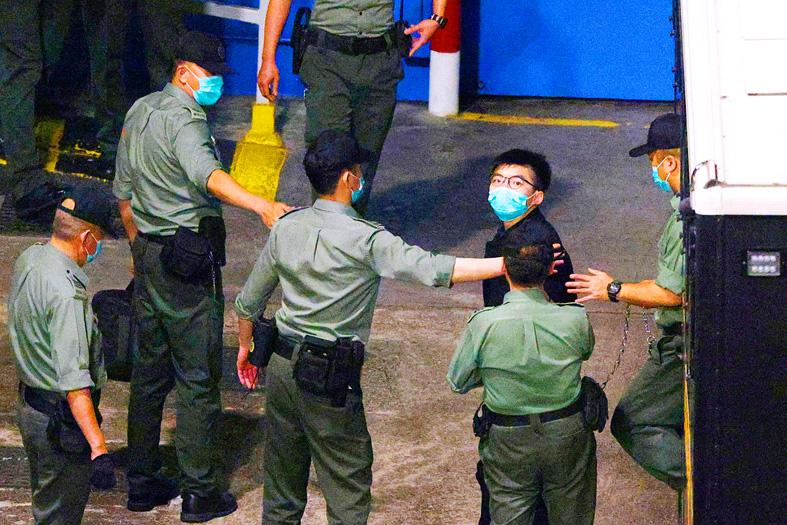Dozens of Hong Kong democracy advocates charged with subversion yesterday returned to court to complete a marathon bail hearing that was adjourned overnight when four defendants were rushed to hospital after hours of legal wrangling.
Police on Sunday arrested 47 of the territory’s best-known dissidents for “conspiracy to commit subversion” in the broadest use yet of a sweeping National Security Law that Beijing imposed on the territory last year.
The defendants represent a broad cross-section of Hong Kong’s opposition, from veteran former pro-democracy lawmakers to academics, lawyers, social workers and youth advocates.

Photo: Reuters
Hundreds of supporters gathered outside a courthouse on Monday for the first post-charge bail hearing, chanting democracy slogans — a rare resurgence of defiance in a territory where protest has been all but outlawed over the past year.
Normally such a bail hearing might take little more than a couple of hours.
However, the court struggled to deal with the sheer caseload as well as the legal vagaries of the broadly worded security law, which removes the presumption of bail for non-violent crimes.
The court sat on and off for about 15 hours throughout Monday as the prosecution called for the advocates to be held in custody until the next hearing in three months’ time while the defense tried to pursue bail.
An adjournment only came in the early hours of yesterday morning after one of the defendants, Clarisse Yeung (楊雪盈), collapsed and was rushed to hospital.
Three other defendants were subsequently taken to hospital in ambulances. At the time of the adjournment, less than half of the bail hearings for the 47 defendants had been heard, a reporter in court said.
The defendants were then taken in handcuffs to a nearby detention center for a few hours’ sleep before returning to court yesterday morning.
Yeung said on Facebook that she fainted after receiving no food for 12 hours and was being treated in hospital for low blood pressure.
The three others who fell ill were also not in court.
Beijing is struggling to quash dissent in semi-autonomous Hong Kong after huge pro-democracy demonstrations in 2019.
The security law has been the spearhead of that crackdown, criminalizing any act considered to be subversion, secession, terrorism or collusion with foreign forces.
It has radically transformed Hong Kong’s relationship with the authoritarian mainland and outlawed dissent in the once free-wheeling territory.
One major area of change is bail.
Under the new law, defendants may only be granted bail if they can persuade a court they no longer pose any kind of national security risk.
Before Monday’s hearing, all those charged with a national security crime had been held on remand, despite agreeing to restrictive measures such as house arrest and making no public statements.
The alleged offense for the 47 facing subversion charges was organizing an unofficial primary election last summer to choose candidates for the territory’s legislature, in the hopes that the pro-democracy bloc might take a majority and stymie government legislation.

FEROCIOUS FISH-EATER Scientists have found a new species of dinosaur from the Cretaceous Period, a ‘hell heron’ that stalked the rivers, deep in the Saharan desert At a remote Sahara desert site in Niger, scientists have unearthed fossils of a new species of Spinosaurus, among the biggest of the meat-eating dinosaurs, notable for its large blade-shaped head crest and jaws bearing interlocking teeth for snaring fish. It prowled a forested inland environment and strode into rivers to catch sizable fish like a modern-day wading bird — a “hell heron,” as one of the researchers put it, considering it was about 12 meters long and weighed 5-7 tons. The dinosaur presented a striking profile on the Cretaceous Period landscape of Africa some 95 million years ago as it hunted

THE TRAGEDY OF PUNCH: Footage of the seven-month-old Japanese macaque has gone viral online after he was rejected by his mother and formed a bond with a soft toy A baby monkey in Japan has captured hearts around the world after videos of him being bullied by other monkeys and rejected by his mother went viral last week. Punch, a Japanese macaque, was born in July last year at Ichikawa City Zoo. He has drawn international attention after zookeepers gave him a stuffed orangutan toy after he was abandoned by his mother. Without maternal guidance to help him integrate, Punch has turned to the toy for comfort. He has been filmed multiple times being dragged and chased by older Japanese macaques inside the enclosure. Early clips showed him wandering alone with

Australian Prime Minister Anthony Albanese yesterday said he did not take his security for granted, after he was evacuated from his residence for several hours following a bomb threat sent to a Chinese dance group. Albanese was evacuated from his Canberra residence late on Tuesday following the threat, and returned a few hours later after nothing suspicious was found. The bomb scare was among several e-mails threatening Albanese sent to a representative of Shen Yun, a classical Chinese dance troupe banned in China that is due to perform in Australia this month, a spokesperson for the group said in a statement. The e-mail

DRUG WAR: The former president said there was no campaign to kill addicts, but his speeches called for violence and told police to use lethal force if necessary Former Philippine president Rodrigo Duterte earned global infamy for the deadly drug crackdown that led to his arrest over crimes against humanity charges, despite his huge popularity at home. A profane-lipped populist and self-professed killer, Duterte’s anti-crime campaign resulted in the deaths of thousands of alleged dealers and addicts. Rights groups said many of those killed were poor men, often without any proof they were linked to drugs. Yet, while drawing condemnation abroad, tens of millions of Filipinos backed his swift brand of justice — even as he joked about rape in his rambling speeches, locked up his critics and failed to